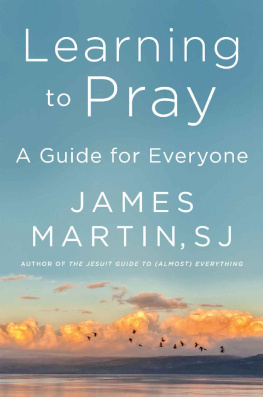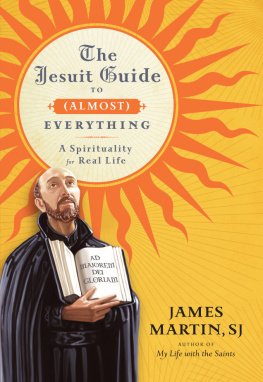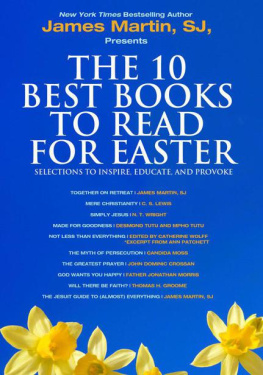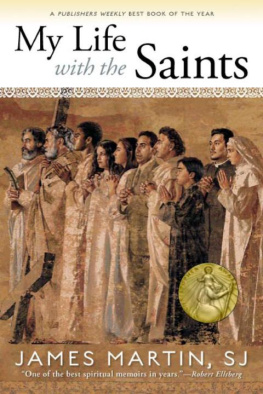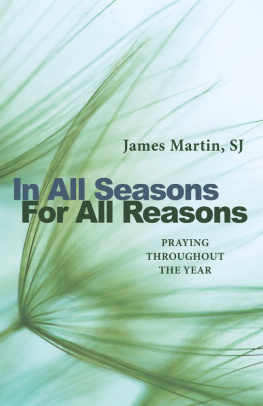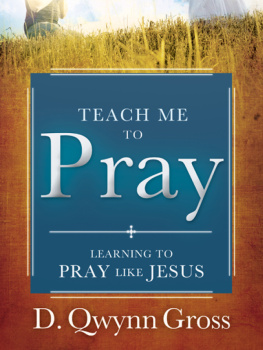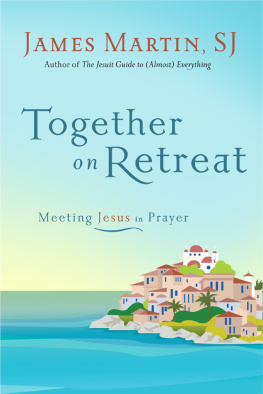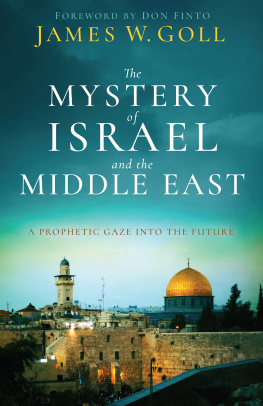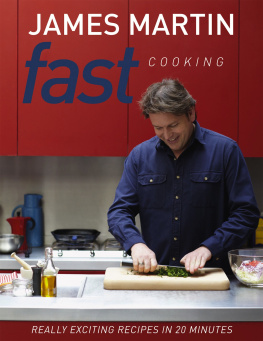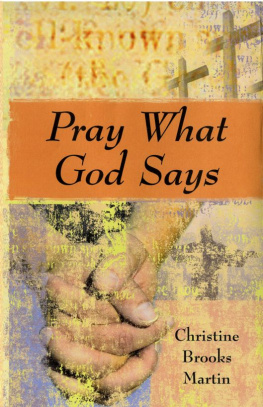James Martin - Learning to Pray
Here you can read online James Martin - Learning to Pray full text of the book (entire story) in english for free. Download pdf and epub, get meaning, cover and reviews about this ebook. year: 2021, publisher: HarperOne, genre: Religion. Description of the work, (preface) as well as reviews are available. Best literature library LitArk.com created for fans of good reading and offers a wide selection of genres:
Romance novel
Science fiction
Adventure
Detective
Science
History
Home and family
Prose
Art
Politics
Computer
Non-fiction
Religion
Business
Children
Humor
Choose a favorite category and find really read worthwhile books. Enjoy immersion in the world of imagination, feel the emotions of the characters or learn something new for yourself, make an fascinating discovery.
- Book:Learning to Pray
- Author:
- Publisher:HarperOne
- Genre:
- Year:2021
- Rating:3 / 5
- Favourites:Add to favourites
- Your mark:
- 60
- 1
- 2
- 3
- 4
- 5
Learning to Pray: summary, description and annotation
We offer to read an annotation, description, summary or preface (depends on what the author of the book "Learning to Pray" wrote himself). If you haven't found the necessary information about the book — write in the comments, we will try to find it.
Learning to Pray — read online for free the complete book (whole text) full work
Below is the text of the book, divided by pages. System saving the place of the last page read, allows you to conveniently read the book "Learning to Pray" online for free, without having to search again every time where you left off. Put a bookmark, and you can go to the page where you finished reading at any time.
Font size:
Interval:
Bookmark:
For William A. Barry, SJ,
whose books, and life,
have helped countless people to pray
Everyone can pray.
Let me put that another way. If I can learn how to pray, then so can you.
If youve never prayed before, or have had trouble praying, or think that youre praying wrong, that opening statement might seem hard to believe. Or too good to be true. But it is true, even though it took me a long time to understand this simple fact: prayer is for everyone.
Until my late twenties I prayed only infrequently and in the most basic way: asking God for help. Let me get an A on my test, Let me get a home run in Little League, Let me get a raise.
Theres nothing wrong with asking God for help; its both human and natural. But until I joined the Jesuits, a Catholic religious order, at age twenty-seven, I didnt realize that prayer could be anything else. When I entered the Jesuit novitiate, however, I learned to pray in new ways. And what I discovered amazed methere are so many ways, so many practices, so much flexibility.
At the same time, I was encouraged to think about prayer in new waysto imagine prayer as a personal relationship with God, to experience what happens when you pray, to understand that there is no one right way to pray, to know that prayer is something that changes throughout your life, and to see how prayer can change your life. So I learned not only how to pray, but also how to understand prayer.
It was a shockalmost as if someone had said, Did you know theres another dimension besides the three dimensions you experience? In fact, thats not a bad analogy. Prayer is like seeing another dimension of life.
My first reaction to this was: Why didnt I know about this before? My second was: Why dont more people know about this?
The answer to the first question was obvious. I didnt grow up in a very religious family, so I had little religious training. Not having attended religious schoolsCatholic or otherwisemeant that I had little exposure to prayer during my elementary-school, junior-high, and high-school years. My family attended church on Sundays and I went to after-school religious education classes for a few years, but we didnt discuss God much at home. We said grace at meals on the big holidays, but didnt pray that muchat least togetheron days other than those.
Lest you get the wrong idea, my parents were good and moral people. Still, my family was like many families today: we talked about the spiritual life with neither frequency nor ease. Neither did anyone else I knew. So I didnt pray much, unless to ask for things. Even when I got to college, I didnt meet many overtly religious people, and those I knew I didnt engage in conversations about prayer.
The second question I asked myself was also easy to answer: Why dont more people know about this? Or, more generally, Why dont more people pray?
To begin with, many do. But when I entered the Jesuits, I didnt know that. For millions of people, prayer is a regular part of life, as natural as breathing. They do it every day, sometimes several times a day. But for just as many people, prayer is foreign. Daunting. Even frightening. Many people, then, just dont pray. Im not talking about agnostics or atheists. They dont pray for an obvious reason: they either doubt or dont believe in Gods existence. Im talking about believers who dont pray.
So why dont some believers pray? Lets consider a few reasons.
Ten Reasons Believers Dont Pray
1. They werent taught. Many people were never taught how to praynot by their families, by teachers at school, or by leaders in their church. Consequently, prayer was never part of their world. So naturally they dont do it.
Its like not knowing how to swim because (a) youve never had lessons; (b) you didnt grow up near a pool or a body of water; and (c) you dont know anyone who swims. You dont know how to swim not only because youve never learned, but also because the entire notion of doing it is foreign. Likewise, if you grow up in a prayer-free environment, its not surprising that you wouldnt know much about prayer.
2. They consider prayer something reserved for holy people, not them. Oh, I cant pray, people sometimes tell me. Im no Mother Teresa! (Ironically, Mother Teresa struggled with prayer, but you get the point.) Perhaps theyve read or heard stories about devout people who turn to God in prayer during difficult times, and they think, That must be nice, but I could never do that, because Im not that religious. Its a reluctance based on a degree of humility, a degree of embarrassment, even a degree of shame. Judging themselves not holy means that they shy away from prayer. But if absolute holiness were a prerequisite for prayer, there would be few who would or could try it.
William A. Barry, a Jesuit priest and the author of many books on prayer, writes in A Friendship Like No Other that the biggest obstacle to prayer is the belief that the relationship with God depends on usor on how good or significant we are. But Gods love does not rely on us and what we do. Gods offer of friendship does not depend on our significance, but solely on Gods desire for us.
3. Theyve been told that theyre praying wrong. A man in his twenties once told me, with immense sadness, that he could never become a priest, because a priest he consulted had told him he was praying the wrong way.
But I love praying this way, he said. Happily, my friend eventually recognized there is no right way to pray, and a few years later he entered the seminary.
Many report similar experiences. They are told theyre praying wrong, but have no one to tell them that there is no wrong way to pray or to encourage them to continue trying. Often, they just stop. Who can blame them?
Or they believe that their prayers have to be lofty and follow certain formulas. People may want to pray but feel that their way of prayer, whatever it is, is wrong. The German theologian Karl Rahner, SJ, writes, This difficulty may... lead serious and thoughtful people to pray infrequently.
4. Theyre turned off by religion and are therefore turned off by prayer. Many people find religion (or a particular church or denomination) distasteful, and because prayer is assumed to be bound up with religion, it too is dismissed. And often when people are raised in a tradition that they later break with, prayer is jettisoned as well. Its no surprise that if people associate prayer with a religious tradition they find boring, stultifying, narrow-minded, misogynistic, racist, homophobic, or abusive, then the impetus to pray is diminished. Why would they want to engage in a practice associated with an unsavory organization? So they dont pray.
Or perhaps they are, more basically, turned off by God, or by the image of a God they have determined for themselves. Who can pray to a God who allows evil to flourish in the world, who allows history to be, as Rahner says, a single stream of stupidity, crudity, and brutality? Why would anyone want to pray to a God who allows those things? The notion that God would want to be with us during those times does not yet figure into their consciousness. So they dont pray.
5. Theyve never been encouraged to think about what they already do as prayer. A few years ago, a man with no formal religious background told me that he had never prayed before. But when we talked about his life, he described a profound experience when he suddenly felt connected to something larger than himself and felt an unmistakable sense of encouragement about his path in life. This memorable experience, which he described in detailwhat the weather was like, where he was standing, how he felt interiorlycame when he was wondering what profession he should choose. At the time, he took this as confirmation that he was on the right path.
Font size:
Interval:
Bookmark:
Similar books «Learning to Pray»
Look at similar books to Learning to Pray. We have selected literature similar in name and meaning in the hope of providing readers with more options to find new, interesting, not yet read works.
Discussion, reviews of the book Learning to Pray and just readers' own opinions. Leave your comments, write what you think about the work, its meaning or the main characters. Specify what exactly you liked and what you didn't like, and why you think so.

